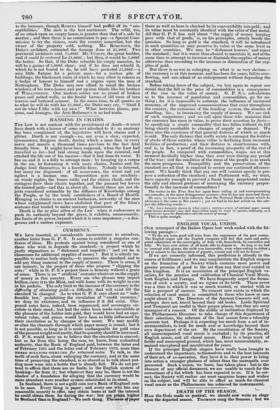• HANGING IN CHAINS.
THE. Law is not content with the punishment of death—it must have death with a horror of some sort attached to it : as anatomy has been complained of, the legislators will have chains and a gibbet. Death is not enough—no, not even a slow, expected, ceremonious, dungeon death, during which a man dies in every nerve and muscle a thousand times previous to the last fatal friendly blow. It might have been supposed, when the Law had• travelled so .far---had laid strong. hoods upon the . criminal, and crushed the life out of his marrow—that it had done its worst. It has so, and it is a folly to attempt more : by hanging up a corpse in the air, by festooning it with rusty chains, Justice and the Judge lend themselves to a horrible farce. Nobody is deterred, but many are disgusted : of all scarecrows, the worst and yet ugliest is a human one. Superstition gets an auxiliary : on Windy nights, the bones rattle and the chains clank,. and the co. ttagers draw their chairs together, and the peasant boy leaves the tainted path—and this is about all. Surely these are not ob- jects considered estimable by the diffusers of Knowledge among the People, or by the ready establishers of a Board of Health.. Hanging in chains is an ancient barbarism, unworthy of the Men -Whose enlightened views have abolished that part of the felon's sentence that tended to Make anatomy ignominious. Death is the ne !As ultra Of the Law : when it endeavours to piish its authority beyond the grave, it exhibits, unnecessarily, the limits of its power, beyond Which it is mere impotence ;--sa dan- gerous and a useless exposure.


























 Previous page
Previous page